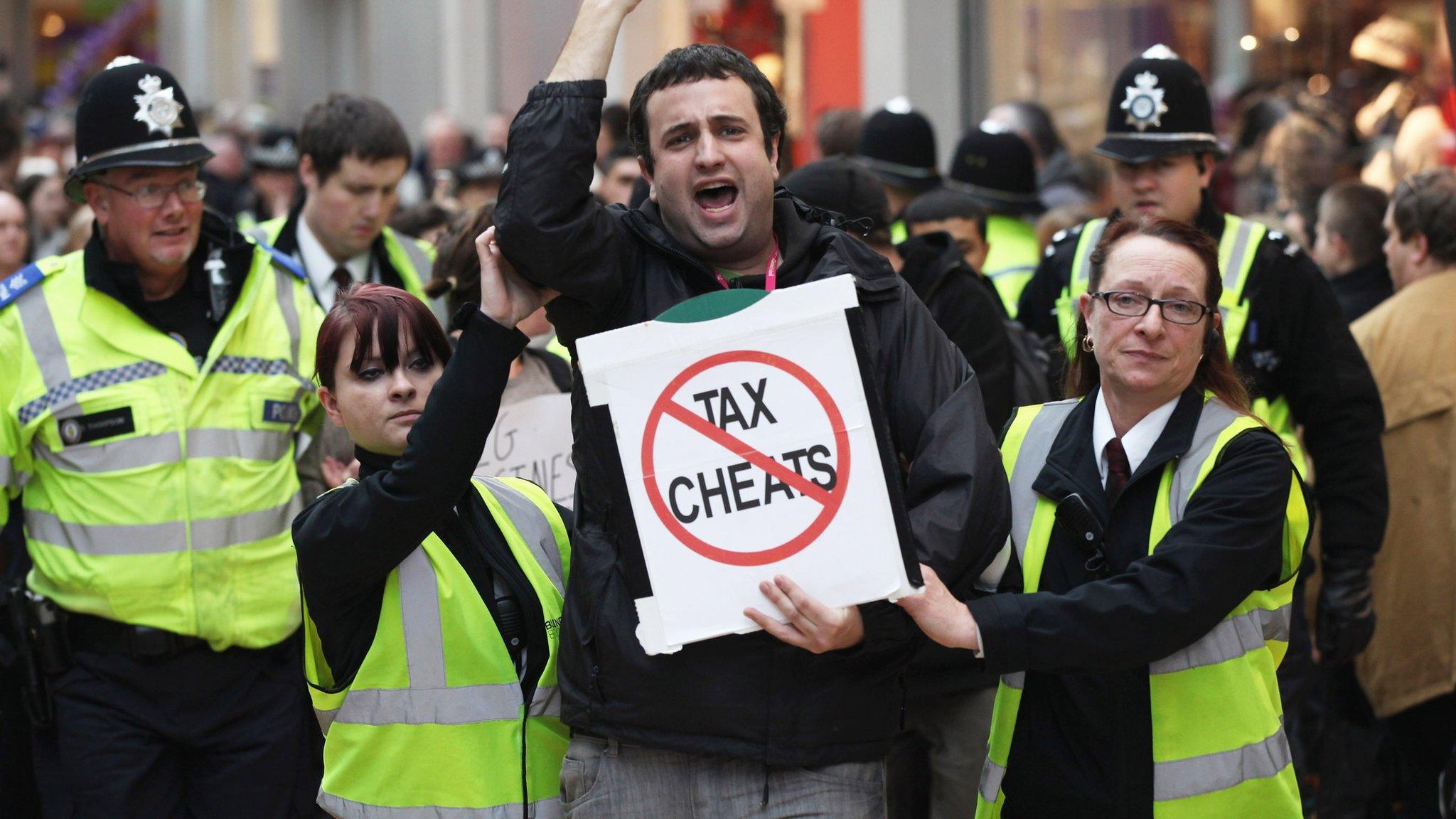Pressure grows to tighten global tax rules
- Published
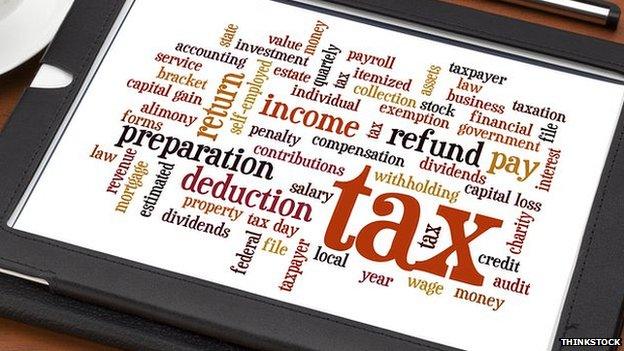
People may not like paying tax. But what is even less popular is the thought they have no choice while others have much more control over their tax bills.
Several high-profile companies make millions of pounds worth of sales in the UK. But a series of media exposes found that they had paid surprisingly little in tax.
The public was angry and politicians are looking to ensure companies pay their fair share of tax.
Margaret Hodge, the Labour MP who chairs the Public Accounts Committee (PAC) says that after the financial crisis, the world "does demand different standards."
"Paying tax should cease to be a voluntary gesture for the rich and the powerful and a civic obligation for the rest of us," she told a conference in London this week.
"We should all pay out fair share."
The event, which was hosted by the PAC, was to discuss the impact of the globalization of taxation.
Now the wheels are in motion to tighten the screws on the international tax system.
Leaders of the world's largest economies are considering whether to ratify new global tax rules next month.
But the task of tidying up the system may prove both controversial and difficult.
Low tax bills
In 2012, Starbucks was found to have paid just £8.6m in UK tax over fourteen years, despite making over £3bn ($4.8bn) in UK sales since 1998. This was because corporation tax is paid on profits and, despite the vast sales, the company reported losses over that time.
The following year, Amazon's UK subsidiary was reported to have paid just £2.4m despite generating sales of £4.3bn.
Google, Apple and others have joined the list of big corporate names that have also found themselves in hot water over their tax bills.
With the effects of the financial crisis still being felt, people were frustrated that these companies were seemingly able to game the system.
As Grace Perez-Navarro, deputy director at the Organization for Economic and Social Development (OECD) said, the world had not seen such public displays of anger over the tax paid by companies since the Boston Tea Party - a reference to pre-revolutionary US protests.
Politicians realised that something needed to be done.

Paying tax seems to be voluntary for some but compulsory for others, believes Margaret Hodge MP
Legality
There is little to stop multinational corporations using their global reach to play national tax rules - and taking advantage of discrepancies or loopholes - in a way that minimises their tax bills.
They adjust their business structures so that they can claim economic activity or value is generated in countries where there is little or no tax to pay.
However, critics argue that there are economic and social costs from companies adopting such strategies.
By avoiding paying tax, these international companies deprive governments of resources.
Figures from HMRC, external, released earlier this month, showed that in 2012-13, the UK lost £3.1bn due to tax avoidance.
Such practices might distort competition, as larger international companies can shift activities around the globe to lower their tax bill in a way that smaller rivals cannot.
Pressure from civil society groups, and certain governments, is mounting on the international community to take action.
And there are signs that it is waking up.
Global problem
The issue is about how globally active companies are able to "game" national tax systems. So to bridge the divide between separate tax regimes, the problem requires a global solution.
"Tax administrations are trapped by their national borders and they need some way to overcome that," says Ms Perez-Navarro.
The OECD, representing 34 economically advanced economies, has led the charge on reforming how global tax rules work.
Last year the OECD put forward a 15-point action plan, external to ensure that companies are taxed where economic activity takes place.
With its cumbersome title, the Base Erosion and Profit Shifting Action Plan (BEPS), aims to stop companies making profits "disappear" for tax purposes. It also targets companies that shift profits to countries where they conduct little or no real activity but where taxes are low.
The idea of the two-year BEPS project is to phase in a series of changes in national and international tax law to close loopholes, clarify financial reporting, and tighten rules on the taxation of certain activities.
In September, finance ministers from the G20 group of advanced economies endorsed the first phase of the programme.
G20 members will report on their progress in implementing the BEPS action plan in November.
Despite this growing international consensus, there is strong criticism that the OECD's project is flawed.
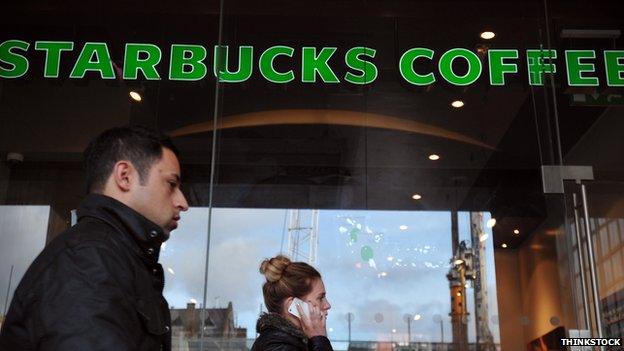
Starbucks, Google, Amazon and others have all faced public criticism for the way they have minimised their tax bills
Criticism
First on the list of critics' gripes is that the OECD is the wrong forum to lead the debate.
The OECD - often seen as only representing richer countries - may not be best placed to find a truly global solution.
Some argue that there should be greater efforts to ensure that lesser economically developed countries are also being heard.
Second, the system needs a deeper overhaul, critics argue.
Most international tax rules are based on various treaties that were initially established by the League of Nations following the First World War.
Sol Picciotto, a professor at Lancaster University, says that the OECD later took on this role and now looks after most international tax rules - around 80%, by his estimations. He believes that the debate should take place in a wider forum.
"They are the tax experts," he says, in relation to the OECD, "but we do need a bigger debate."
"They can do running repairs as they go along but I think as they get more into the project, they will see how the machine also needs redesigning."
Richard Murphy, a director of Tax Research UK, agrees that the international tax system "is worn out."
"We pretend that there are thousands of companies in multinational corporations all of which are independent when quite clearly that's a fabrication."
The problems facing the OECD, and others, are numerous and complex. The complexity of the UK's tax system doesn't help.
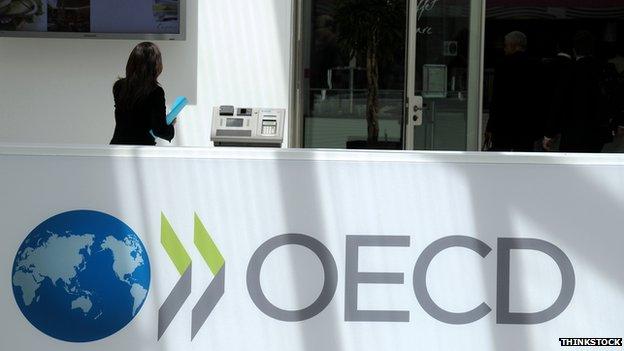
Tax code
Michael Izza, chief executive of the Institute for Chartered Accountants in England and Wales, says that the UK has one of the most complex tax systems in the world.
In 2007, the UK tax code run to around 11,500 pages. Now it is around 17,000 pages, he says.
He is calling on MPs to take this issue forward. "We've got to be serious about simplification."
Richard Bacon, a Conservative member of the PAC, agrees that there have been problems with the UK tax code.
When it gets to such a length, "surely the only possible solution is to set it on fire," he jokes.
Trouble ahead
Joking aside, ironing out wrinkles in the global tax regime is no mean feat.
Some doubt whether there is sufficient political willingness to implement the OECD's project.
Even if there is, there are questions over whether the system can be fixed or whether it should be discarded and completely overhauled.
And at the heart of this debate, policymakers are trying to ensure that their drive to boost tax revenues doesn't harm business.
"Despite all of the public outcry and, perhaps some might say, the tarring and feathering of multinationals, it is important to understand that this is not an anti-business agenda for us," says the OECD's Grace Perez-Navarro.
Role of business
Policymakers have a tough task ahead. But some are asking whether businesses should be play a more active role in the debate.
Rather than pay only what they are legally obliged to, the argument goes, businesses should ensure that that are contributing a sufficient amount to the society that lets them thrive.
Justin King, former chief executive of Sainsbury's, says businesses often argue that they pay tax as the law requires them to.
However, this is the just a minimum requirement, Mr King says, "it doesn't make you a good citizen."
Consumers should be able to question a company's tax policy as much as they question a company's environment and social policy, he argued.
It remains to be seen whether businesses will shift tactics.
But whether companies do so or not, the political drive to change the international tax system could force businesses to change how they operate.
- Published7 October 2014
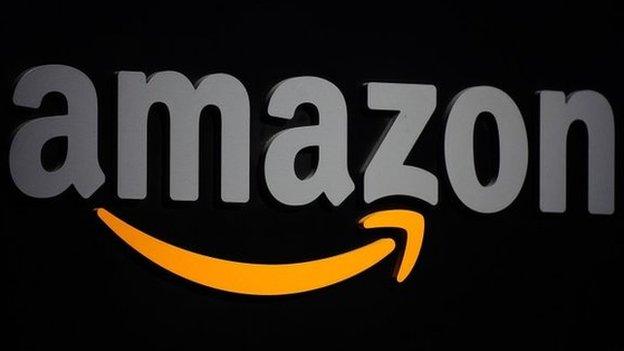
- Published30 September 2014
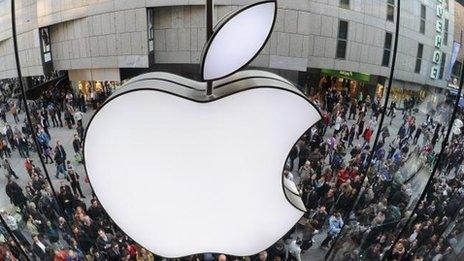
- Published5 September 2013
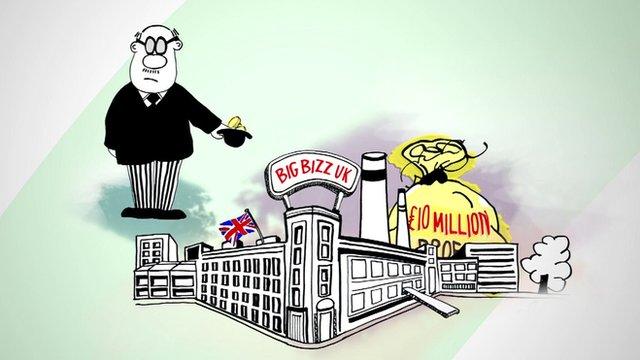
- Published21 May 2013
